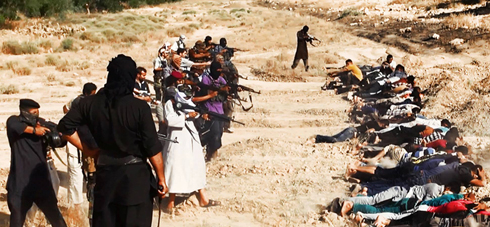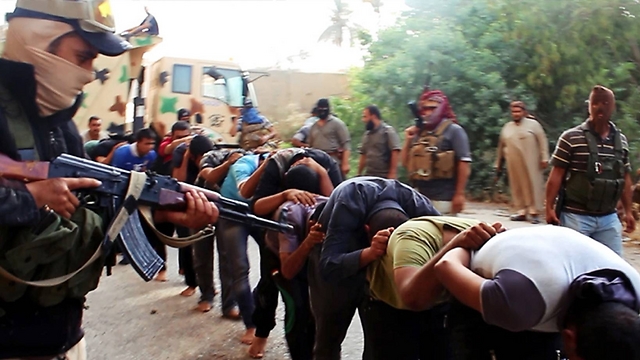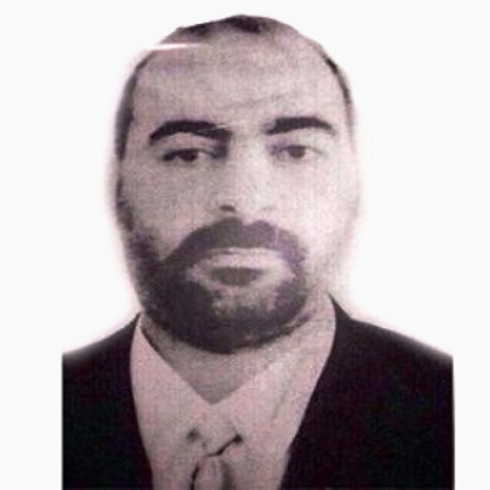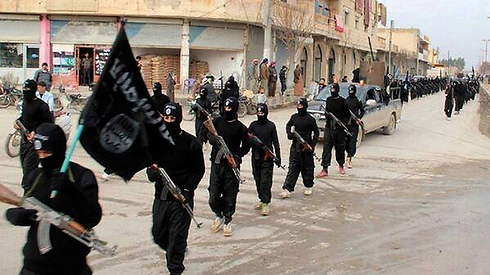
Al-Baghdadi
Al-Baghdadi: The man behind ISIS
ISIS leader trained under command of Musab al-Zarqawi, spent 4 years in US prison in Iraq; photos of mysterious leader remain scarce.
The organization "The Islamic State" formerly known as "The Islamic State of Iraq and Syria" or ISIS, announced the creation of an Islamic Caliphate last week, in the areas that the group captured from Iraq and Syria. The bold move is part of ISIS' vision to restore the days just after the Prophet Muhammad when an Islamic Caliphate ruled the Middle East.


More recently, the Muslim group called on Muslims from around the world to move to the new Caliphate, or what it called "Their natural country", and gather under the flag of the man behind ISIS: Abu Bakr al-Baghdadi.
Al-Baghdadi, who used to be a professor in his field, is a secretive figure whose location is currently unknown though he is recognized among the leaders of global jihad organizations.
Related stories:
- Report: US fears Israel would be dragged into war with ISIS
- Report: Iraqi army retakes Tikrit from ISIS
- Israel needs massive fence on eastern border
He rose to stardom last year, when conflict arose between al-Baghdadi and al-Qaeda's leader in Syria Jabhat AL-Nusra. Al-Qaeda is a merciless organization in and of itself, but it maintains that the medieval tactics utilized by ISIS in executing and torturing its enemies are too inhumane even for al-Qaeda. The decision was taken to disown Baghdadi and his rogue organization.
In the last month, ISIS has made significant military expanses in Iraq where they conquered a string of large cities including Mosul and Tikrit. Together with territory it had already captured in Syria, ISIS now controls a relatively large area.
Al-Baghdadi's goal is to create an Islamic nation from Iraq in the east and to the coast of the Mediterranean in the west that will follow strict Sharia Law taking the most extreme of measures in controlling its people.
ISIS has already taken steps to enforce its strict religious views in the territories they have already captured including forbidding music, ordering women to stay at home, and butchering hundreds of people who oppose them. Men are required to pray five times per day and alcohol is also forbidden.
The "Caliph" a word that means "the replacement" in Hebrew, or "the successor" is considered to be the spiritual leader of the Islamic world as the successor of the Prophet Muhammad on Earth.
The Caliph was the leader of the Islamic Empire more than 1,000 years ago and remained an official position until the destruction of the Ottoman Empire in 1924. The ISIS jihadists want to bring back the days of the Islamic Empire and at the beginning of the week they announced its creation.

ISIS militants publicized this photo when they claimed to have executed hundreds of captured Iraqi soldiers. (Photo: AP) (צילום: AP)
The French publication Le Monde called al-Baghdadi "legendary" in the eyes of jihadists, and wrote that his name is renowned from Indonesia to Mauritania and even in certain places in Europe.
There are few stories about al-Baghdadi's past, but from all estimates he was born in 1971 making him 43-years-old today. According to some of the reports, he was born in Samarra in Iraq, just north of Baghdad. Other sources name Dali in eastern Iraq as his home town.
His family belongs to the a-Samarai tribe and al-Baghdadi himself was a student at the Islamic University in Baghdad.
"I'll see you in New York"
Up until 2003, al-Baghdadi had never carried a weapon, but the American invasion in Iraq motivated him to take part in violent struggle. He joined al-Qaeda under the command of Osama Bin-Laden and was famous for being a savage fighter without mercy.
Al-Baghdadi was himself the student of an al-Qaeda operative who was no less cruel, the Jordanian Abu Musab al-Zarqawi who commanded al-Qaeda's forces in Iraq and was assassinated by American forces in 2006.
Al-Zarqawi was apparently successful in teaching al-Baghdadi his ruthlessness and efficiency. In 2010 the two managed to coordinate 60 terrorist attacks all in one day, killing 110.
According to reports, al-Baghdadi was a prisoner in an American base in Iraq for four years and upon his release in 2009 he promised the guards, "I'll see you in New York". He was imprisoned in the facility reserved for the most dangerous and extreme terrorists in custody.

ISIS militants force a column of what they said were captured Iraqi soldiers who they later executed. (Photo: AP) (קרדיט: AP)
In the coming years al-Baghdadi tried to reconnect to al-Qaeda, but was met with a cold shoulder. Gradually he began to challenge Bin-Laden's and al-Zarqawi's organization and in May 2014 he announced his departure from al-Qaeda, demanding that the group swear an oath to the new Islamic state he was determined to create.
Al-Baghdadi's voice can be heard on several recordings released by his organization, but finding pictures of the mysterious figure is a much more difficult task. In the publication Al-Hayat, it was reported that "Al-Baghdadi is jihadist who's kept away from the camera lens and public stage."
"In this way he is different from Bin-Laden and al-Zarqawi, the leaders of al-Qaeda who were publicized through recordings and photographs that they sent to media outlets," said the report. That's also the reason that one of the only photographs of al-Baghdadi was provided by the Iraqi government at the beginning of 2014.
According to recent reports from Syria, ISIS took control of two towns in the east of the country, Mayadin and Shohail which were previously controlled by Jabhat AL - Nusra.
The takeover of the region was allowed by alliance between the militants and local residents. According to The Syrian Observatory of Human Rights based in London, ISIS currently controls an area of Syria five times larger than Lebanon.
Meanwhile, Al-Arabiya reported that Saudi Arabia sent 30,000 soldiers to their border with Iraq Thursday after Iraqi soldiers withdrew from the area. The entire border between the two nations stretches some 800 kilometers.
According to the report in Al-Arabiya, which is based in Saudi Arabia, the withdrawing Iraqi soldiers left the border unguarded, and judging by satellite images made their way to the desert east of Karbala.
US forces also stepped up action Thursday in fear of attacks from Jihadists by increasing security in airports worldwide.












